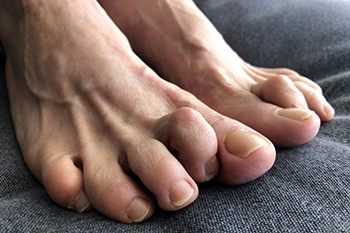
The foot condition known as hammertoe is easy to notice. It causes the second or third toe to bend downward at the tip, forcing the toe upward at the middle joint resembling a hammer. It is considered to be a deformity and corns may develop on top of the joint as it rubs against the shoe. Additional symptoms may include swollen toes, pain in the affected joint, and difficulty walking. Practicing toe stretches can be an effective hammertoe exercise. This is done by getting into a runner’s starting position and shifting the body’s weight over the toes. Hold for several seconds while the toes are pressed against the floor. Another exercise is called toe flexion and extension and starts with sitting with the legs straight out. After placing the affected foot over the opposite knee, the toes can be pulled back and pointed as best as possible. This may be difficult to accomplish, depending on the severity of the hammertoe. If you are afflicted with this condition, you must be under the care of a podiatrist who can help you with proper treatment which may include surgery to permanently straighten the toes.
Hammertoe
Hammertoes can be a painful condition to live with. For more information, contact Frederick Matthews, DPM from Innovative Foot and Ankle Care. Our doctor will answer any of your foot- and ankle-related questions.
Hammertoe is a foot deformity that affects the joints of the second, third, fourth, or fifth toes of your feet. It is a painful foot condition in which these toes curl and arch up, which can often lead to pain when wearing footwear.
Symptoms
- Pain in the affected toes
- Development of corns or calluses due to friction
- Inflammation
- Redness
- Contracture of the toes
Causes
Genetics – People who are genetically predisposed to hammertoe are often more susceptible
Arthritis – Because arthritis affects the joints in your toes, further deformities stemming from arthritis can occur
Trauma – Direct trauma to the toes could potentially lead to hammertoe
Ill-fitting shoes – Undue pressure on the front of the toes from ill-fitting shoes can potentially lead to the development of hammertoe
Treatment
Orthotics – Custom made inserts can be used to help relieve pressure placed on the toes and therefore relieve some of the pain associated with it
Medications – Oral medications such as anti-inflammatories or NSAIDs could be used to treat the pain and inflammation hammertoes causes. Injections of corticosteroids are also sometimes used
Surgery – In more severe cases where the hammertoes have become more rigid, foot surgery is a potential option
If you have any questions please contact our office located in Plano, TX . We offer the newest diagnostic and treatment technologies for all your foot and ankle needs.
